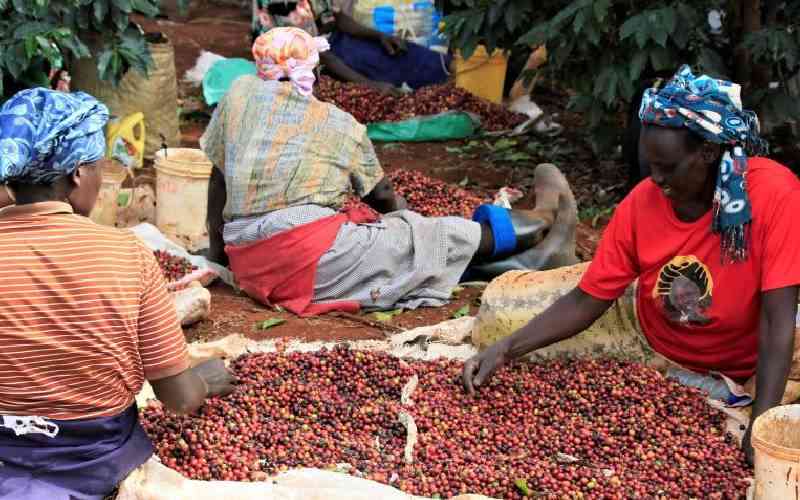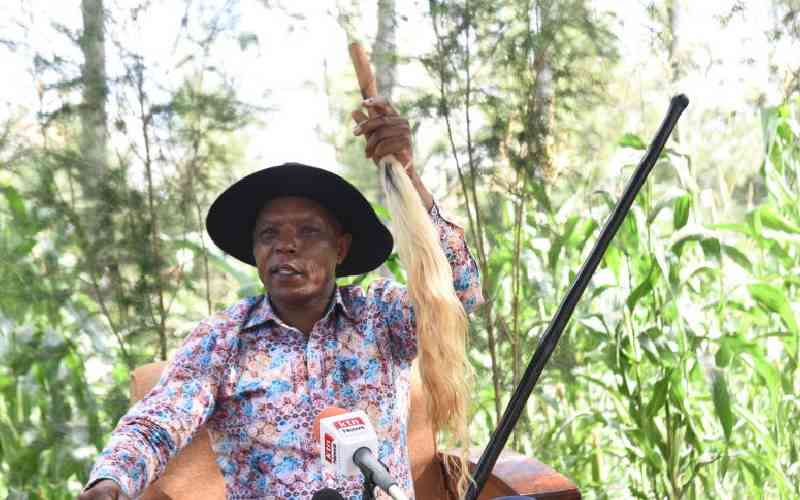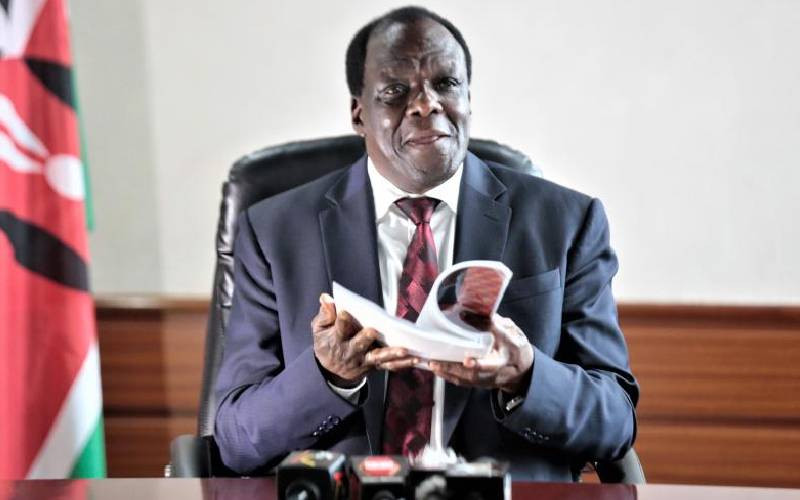According to the National Poverty Index (NPI), less than two members per household in Kakamega County have an income. You are on record as having warned that sugarcane impoverishes your people. What are the negative effects of sugarcane farming?
The first thing I did when I assumed office was form a taskforce specifically to look at the sugar industry because we realised that it was not doing well. I formed a taskforce which has given a full report. We have come up with a Sugar Bill that will favour the farmers.
At the moment, the miller dictates the industry. We want a situation where there is a balance. We have already started separating the farmer from the miller.
When sugarcane was introduced in 1976, there was a condition that you could not grow sugarcane in your own land, but that was ignored.
We are now emphasising through the Bill that you leave at least one third of your land for food production because sugar farmers are living hand to mouth. The cash flow is not there, so you find that sugarcane has brought more poverty than there was before.
With its high population density, Kakamega County has a poverty rate above 50 per cent, with Ileho, Ikolomani and Shinyalu sub-counties the poorest, according to the NPI. Diversification in agriculture is too low to secure rural incomes, so what is your government doing to address this?
Apart from having the sugarcane taskforce, I have formed another taskforce to look into the possibility of growing horticultural products and also dairy farming.
At the moment, as a county, we have started what we call the One Cow Initiative, where we are targeting at least one cow per household. Already, we have set aside Sh28 million for this and committees are being formed at the sub-location level to identify who will benefit. We want farmers, as they grow sugarcane, to have another income source.
We have also started constructing markets and they will have stalls specifically for horticulture products.
Only 35 per cent of farmers in the county grow cash crops, a majority of them grow sugarcane and a few others tea. Shouldn’t your government be thinking of economic diversification rather than just agriculture?
At the moment, this is a free economy. Someone does what they know will enable them make money. As things are, I cannot tell them en masse to get out of sugarcane because what will they survive on?
What I am now telling them is to diversify so that we can have some dairy, horticulture and other ventures so that if they discover dairy brings more money than sugarcane, they can then move to dairy and forget about sugarcane. What we are doing as a county government is giving them many alternatives.
What other initiatives are you looking at to increase employment and income and entrench food security in Kakamega County?
To empower our people, we need to invest in value addition. We are planning to set up a maize milling plant in Lugari as well as a tea factory in Shinyalu. This will create employment opportunities.
But we must first protect the existing industries, which is why we have allocated a revolving fund to protect the sugar industry. We have allocated Sh200 million to the Mumias Sugar factory with the approval of the county assembly to enable it pay farmers and keep operating.
Stay informed. Subscribe to our newsletter
We have no problems with Butali or West Kenya. What happened with Mumias is that they overcommitted themselves to big projects like ethanol, co-generation and bottled water. These projects have not broken even, so the company at the moment has serious financial problems and that is why we have come in, because farmers have to live, need to buy food, need to pay school fees and they cannot. That is why we have moved in to help them.
Sufficient income diversification depends heavily on human capital, access to healthcare and education, infrastructure and financial capital. What has your government done in these key areas?
The health sector is a very key aspect of developing human capital because you must have a healthy workforce to achieve growth. The flagship projects in this sector include the establishment of a county medical school, expansion of existing medical facilities and the rehabilitation of Kakamega Medical Training College.
The Afya kwa Mama na Watoto Programme has ensured mothers are able to obtain money through cash transfers to take care of their newborns. This also encourages them to seek professional services while giving birth to reduce both maternal and child mortality.
In the education sector, we have set out to build ECD [early childhood development] centres, county polytechnics and improve infrastructure in schools.
We have allocated substantial resources in the budget to roads, both in the urban and rural areas, to improve access and have even rehabilitated the airstrip in Kakamega. We have also set up markets in every sub-county.
Money has also been allocated to MCAs to conduct development in their wards. Each of the 60 wards has received Sh11 million for development and bursaries to promote equitable access to resources.
In this year’s budget, we have set aside Sh70 million for an enterprise development fund aimed at providing affordable loans for business development.
Agricultural extension services to farmers in Kakamega County are a major challenge. How will your government overcome this?
What I discovered when I became governor is that multitasking is not existent. You find that in livestock, veterinary and horticulture, you need an extension officer for each.
I think the best sitution would be having have one person specialising in all these, otherwise it becomes expensive to employ four extension officers at the sub-location level.
The Government must change its curriculum so that you can be an agriculture fellow but can do livestock, horticulture and other crops at the same time. It is a challenge for us even to employ the number we need. With the wage bill that we have right now, we cannot afford to pay.
We have discussed this and we want to take them for a crash programme at the Bukura Farmers Training Centre so that at least they have basic skills in all these, and then maybe we can also use the private sector to help us provide extension services.
Because of their grassroots presence, county governments are seen as most ripe for public-private partnerships. Is your government pursuing any PPPs?
If you look at the PPP Act the way it is right now, you find that for us to undertake any PPP, we must get approval from the Treasury. That has become a bottleneck. So we must come up with a PPP ourselves that will help us.
Also, with the funds that we are getting right now, we cannot develop the county faster. We must have the capacity to borrow. There was to be a provision in the County Governments Act spelling out how counties can borrow. Of course you would need the national government’s guarantee. That has not been finalised, but it needs to be done so that we are able to borrow.
For instance, there is someone who is interested in investing in milk processing, but the person is saying they want 50 acres. I can’t raise 50 acres now; the person is here, but I am incapacitated. It will mean I have to move people, which takes money.
That is why the national government should be able to tell us how much we can borrow.
Like I want to construct a road, each kilometre is Sh50 million. I want to construct 200km in four years, which will cost Sh10 billion. I cannot raise that from the current allocation of Sh7 billion. And there are so many informal businesses around that collecting revenue is a challenge.
It is shameful to go out in the streets to collect money from a Mama Mboga doing business. So you must formalise the situation by building markets. The cheapest market now is Sh80 million. How many will I build with Sh7 billion when salaries take half of that money?
We have a shortage of staff. For example, in healthcare, we have a shortage of 900 nurses. I have 38 health centres that are complete but not operational because I cannot employ 900 nurses at a go. Even if I did, I would not have money to pay them, and I would also not do any development in this county.
What changes are necessary to ensure State-owned millers become competitive, given the myriad problems facing them, including corruption, heavy debts, cane poaching and fragmented land holdings?
I can say clearly that the national government ran down the sugar industry and took too long to intervene. Here I am, agriculture has been devolved, but the national government is still hanging on to the 20 per cent it holds in Mumias.
A director comes from the ministry of Agriculture in Nairobi and the Treasury to attend a board meeting for Mumias. I am like an outsider because I have no role to play, but because agriculture is devolved, farmers are always on me.
I have written to the national government to empower me to deal with the issues being raised, devolve to me the 20 per cent shareholding in Mumias Sugar and then I will be able to enter into Mumias and address those issues.
But as an outsider, I will just be a noise maker. How can I tell Mumias to change their technology or ask about their debt level, yet I am not a shareholder nor do I have a say in that company?
Sugarcane poaching is one of the problems and it has been highlighted in the taskforce report. The way we are going to deal with it is through legislation. We are going to come up with a standard contract. The current contract favours the miller ... the new contracts will be in the custody of farmers’ associations, not millers.
We want to have a strong farmers’ association that will be able to engage the national government to stop the importation of contraband sugar into the country.
As counties growing sugarcane, like Kakamega, Kisumu, Bungoma, Siaya and even Kwale, we want to come together to form a strong association at the governors’ level so that we can engage the national government on some of these issues.
Do you think the creation of the Agriculture Fisheries and Food Authority (AFFA) will boost farmers’ production and incomes?
You see, the problem I am seeing is that while the law is there, it has consolidated decision making at the centre.
It also interferes with devolution, and as a council of governors, we have raised issues about that particular law. It is now giving too much power to that authority to make decisions. If I want to uproot sugarcane from my farm, I need permission from them. How do you devolve and again you want to control me from Nairobi?
We are coming up with our own legislation on agriculture. The Constitution is very clear that if we are to come up with legislation to do with our devolved functions, then it is superior to the national government’s legislation.
But we have also had a problem of capacity at the county assembly level. The speed of passing laws has been very slow. But we are hopeful that since they have had training on capacity building this past year, they will expedite. We have 13 laws pending before the county assembly.
bizbeat@standardmedia.co.ke
 The Standard Group Plc is a
multi-media organization with investments in media platforms spanning newspaper
print operations, television, radio broadcasting, digital and online services. The
Standard Group is recognized as a leading multi-media house in Kenya with a key
influence in matters of national and international interest.
The Standard Group Plc is a
multi-media organization with investments in media platforms spanning newspaper
print operations, television, radio broadcasting, digital and online services. The
Standard Group is recognized as a leading multi-media house in Kenya with a key
influence in matters of national and international interest.
 The Standard Group Plc is a
multi-media organization with investments in media platforms spanning newspaper
print operations, television, radio broadcasting, digital and online services. The
Standard Group is recognized as a leading multi-media house in Kenya with a key
influence in matters of national and international interest.
The Standard Group Plc is a
multi-media organization with investments in media platforms spanning newspaper
print operations, television, radio broadcasting, digital and online services. The
Standard Group is recognized as a leading multi-media house in Kenya with a key
influence in matters of national and international interest.





